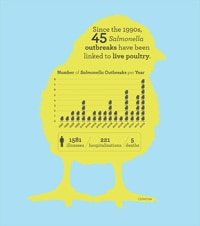Risk of Human Salmonella Infections from Live Baby Poultry
- Details
- Published on Wednesday, 04 March 2015 12:10
 Peep, chirp, quack! Live baby poultry, such as chicks, ducklings, goslings, and baby turkeys, can carry harmful germs called Salmonella. After you touch a chick, duckling, or other baby bird, or anything in the area where they live and roam, WASH YOUR HANDS so you don't get sick!
Peep, chirp, quack! Live baby poultry, such as chicks, ducklings, goslings, and baby turkeys, can carry harmful germs called Salmonella. After you touch a chick, duckling, or other baby bird, or anything in the area where they live and roam, WASH YOUR HANDS so you don't get sick!
Often, live baby poultry may be put on display at stores where children may be able to touch the birds or areas where they are displayed. Because these birds are so soft and cute, many people do not realize the potential danger that live baby poultry can be, especially to children.
Cute but risky?
Each spring, some children become infected with Salmonella, but it is important to remember that illness can occur from these baby birds or adult birds at any time of the year.
Live baby poultry can carry Salmonella and still look healthy, but can spread the germs to people. Children can be exposed to Salmonella by holding, cuddling, or kissing the birds and by touching things where the bird lives, such as cages or feed and water bowls. Young children are especially at risk for illness because their immune systems are still developing and because they are more likely than others to put their fingers or other items into their mouths.
Gastrointestinal (Enteric) Diseases from Animals
Check out CDC’s Gastrointestinal (Enteric) Diseases from Animals website, your one-stop-shop for information about zoonotic outbreaks, prevention messages, and helpful resources.
How do people get Salmonella infections from live baby poultry?
Live poultry may have Salmonella germs in their droppings and on their bodies (feathers, feet, and beaks) even when they appear healthy and clean. The germs can also get on cages, coops, hay, plants, and soil in the area where the birds live and roam. Additionally, the germs can be found on the hands, shoes, and clothing of those who handle the birds or work or play where they live and roam.
How do people get infected?
People become infected with Salmonella when they put their hands or other things that have been in contact with feces in or around their mouth. Young children are especially at risk for illness because their immune systems are still developing and because they are more likely than others to put their fingers or other items into their mouths. It is important to wash hands immediately after touching poultry or anything in the area where they live and roam, because the germs on your hands can easily spread to other people or things.
How do I reduce the risk?
DO
- Wash hands thoroughly with soap and water right after touching live baby poultry or anything in the area where they live and roam. Use hand sanitizer if soap and water are not readily available.
- Adults should supervise hand washing for young children.
- Clean any equipment or materials associated with raising or caring for live poultry outside the house, such as cages or feed or water containers.
DON'T
- Don’t let children younger than 5 years of age, older adults, or people with weak immune systems handle or touch chicks, ducklings, or other live poultry.
- Don't snuggle or kiss the birds, touch your mouth, or eat or drink around live baby poultry.
- Don't let live baby poultry inside the house, in bathrooms, or especially in areas where food or drink is prepared, served, or stored, such as kitchens or outdoor patios.
- Don’t eat or drink in the area where the birds live or roam.
- Don't give live baby poultry as gifts to young children.
- Send a Health-e-Card: Teach Hand Washing
- Download a CDC Kidtastics Podcast: Why Parents Should Think Twice Before Giving Baby Birds to Young Children for Easter [PODCAST - 4:09 minutes]
What are the signs, symptoms, and types of treatment available for Salmonella infections?
Salmonella can make people sick with
- Diarrhea
- Vomiting
- Fever
- Abdominal cramps
Sometimes, people can become so sick from a Salmonella infection that they have to go to the hospital. Infants, elderly persons, and those with weakened immune systems are more likely than others to develop severe illness. When severe infection occurs, Salmonella may spread from the intestines to the bloodstream and then to other body sites and can cause death unless the person is treated promptly with antibiotics.
You can learn more about the signs, symptoms and treatment of Salmonella infection by visiting the CDC's Salmonella website. If you suspect you or your child has Salmonella infection, please contact your health care provider immediately.

Are there any restrictions about owning live poultry?
Rules and regulations vary by city, county, and state ordinances, so check with your local government to determine restrictions about owning live poultry.



